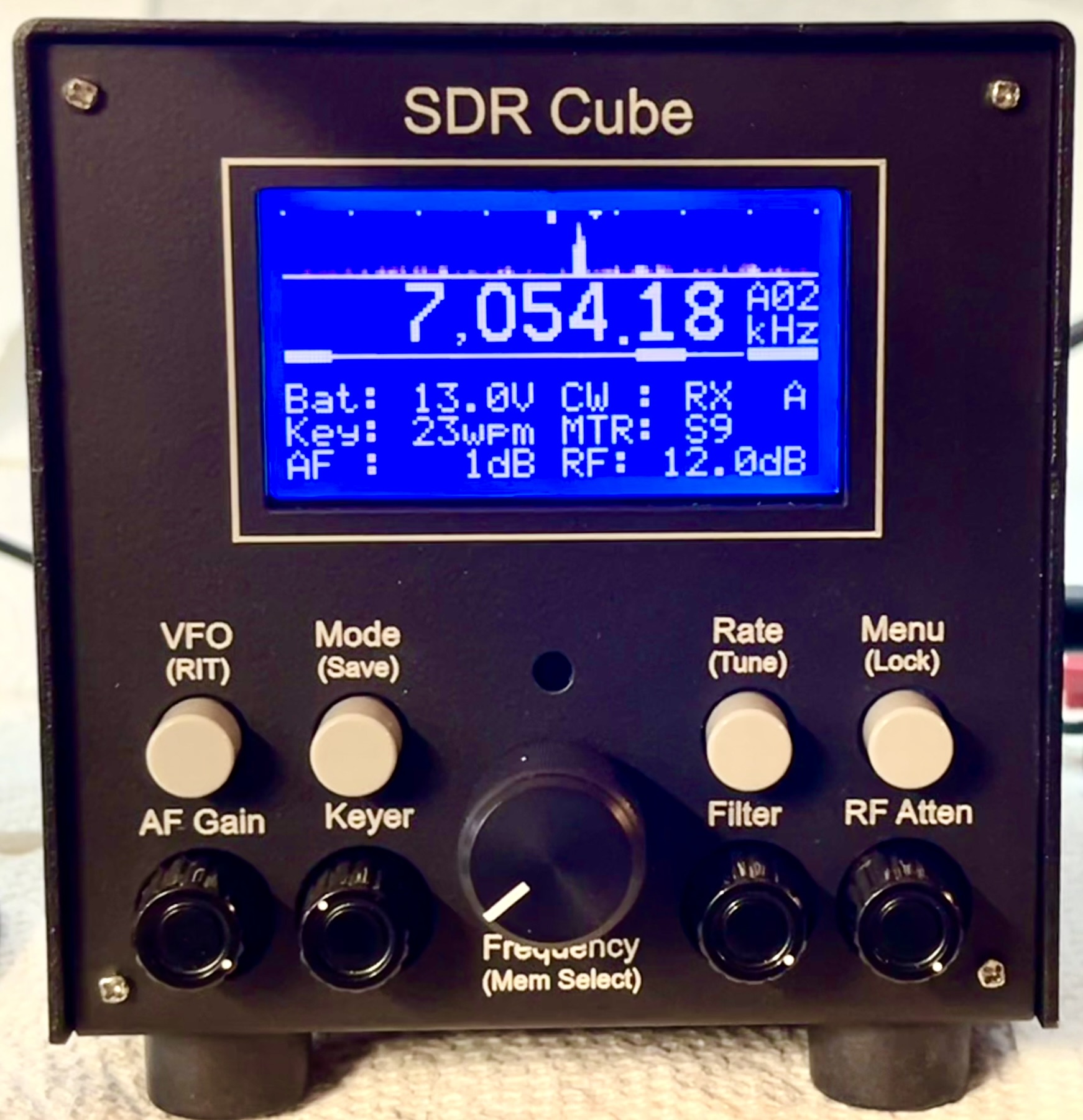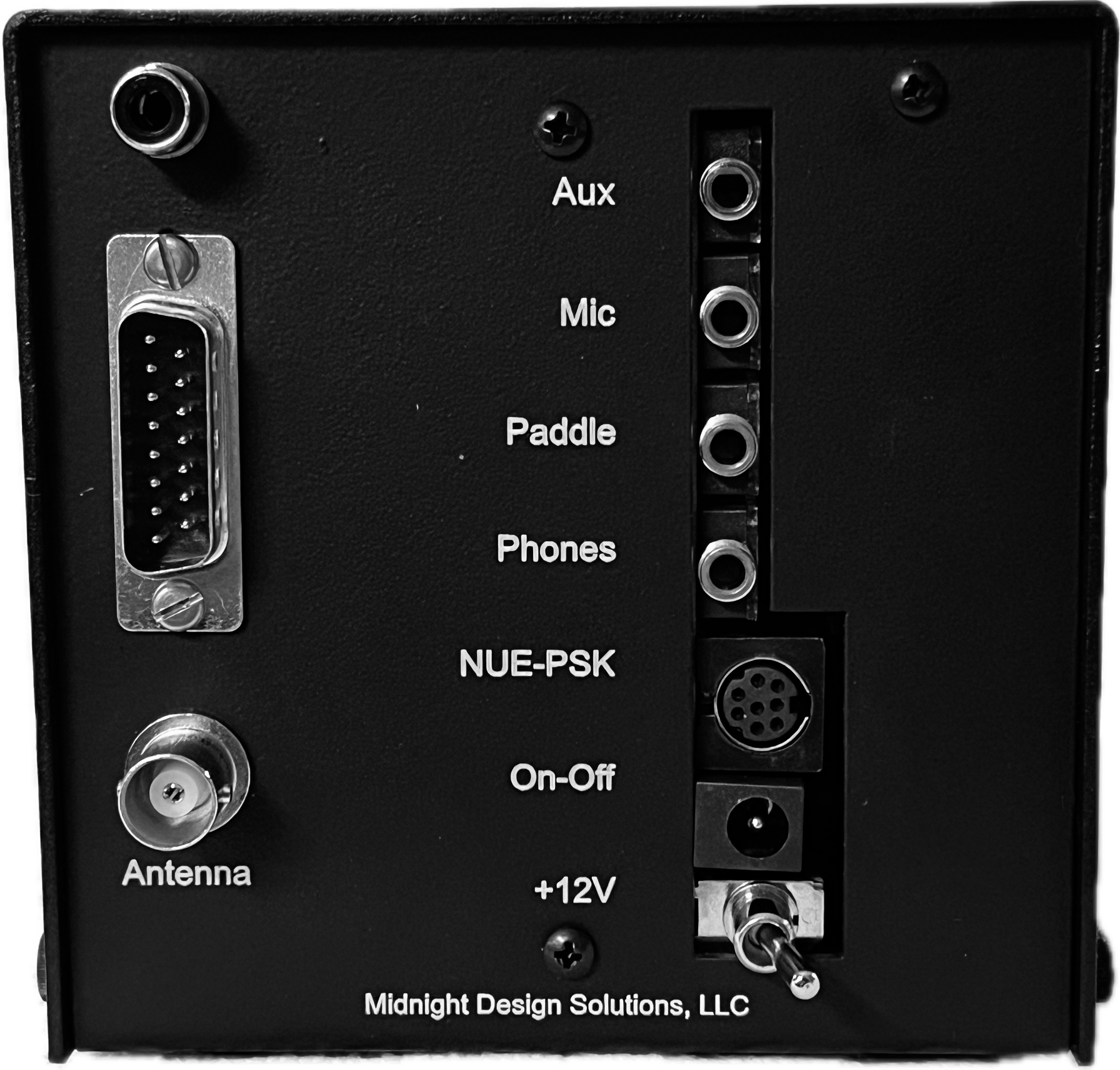eMail List | News | Online Assembly Guide | Photo Gallery
|
|
|
| Products | Order | Home |
Features & Specs |
Software
|
Articles & Reviews |
Documentation eMail List | News | Online Assembly Guide | Photo Gallery |


SDR Cube Transceiver
Portable,
standalone SDR transceiver for SSB, CW and AM using embedded digital signal
processing
with a Softrock as the RF front end for QRP operation. Live bandscope,
high-performance T-R switching,
multiple VFOs & memories, General Coverage Receive and bandswitching control are among the many
advanced features.
Expansion
port supports external RF decks and accessories. Optimized interface for
NUE-PSK modem provides digital mode support.
The SDR Cube is a totally self-contained, embedded SDR transceiver for CW, SSB and AM using a Softrock for the RF front end and a pc board implementation of an HF modem. PC is not needed for using the SDR Cube, as all DSP processing is accomplished by an embedded DSP processor on the three internal pc boards. The Cube is designed to fit into an optional 4” x 4” x 4.5” pre-cut,black powder-coated aluminum enclosure containing all controls, a blue graphic display indicating transceiver settings and an exciting 8 kHz-wide band scope of spectrum signals, and the popular Softrock RXTX v6.3 board. The SDR Cube may also be used with any of the 11,000 other Softrocks in the field today! Sold as a kit or as a fully assembled & tested transceiver, both the product versions are in stock. We presented on the SDR Cube at TAPR's annual "Digital Communications Conference" in Portland, Oregon, and the DCC Proceedings containing our paper is available in our Documentation page. Product details are presented here on this website, and active email discussion occurs in Chat With The Designers (CWTD) in Groups.io
Standalone SDR transceiver ... No PC required, portable, compact
General Coverage Receiver, and user-replaceable Tx Band Modules ... Based on the I/Q RF front end
Softrock-compatible ... Designed to interface with SR v6.3 RXTX, etc.
Low Power ... 90ma (Cube), plus 100 ma (Softrock Rx) or 400 ma (Software Tx)
RF Amp, Attenuator and AGC ... Good control of incoming RF
Quadrature Sampling Clocking options ... DDS, Si570, or I2C to target Softrock
Built-in Keyer ... 1-100 wpm, Iambic A, B, or straight key
Popular HF modes ... SSB, CW, AM, Digital (with special interface to NUE-PSK for digital modes)
Special interface to NUE-PSK Modem ... Digital interface provides best quality
Graphic LCD Display ... Provides clear indications of the many status and options
Bandscope ... Provides +/- 4 kHz spectrum visibility for Rx, signal monitor for Tx
Audio filtering ... Low corner 200Hz, high corners 700, 1500, 2400 or 3600Hz
Audio Output ... Headphones or amplified speaker, binaural audio
Beeper ... User interface clicks, code practice oscillator, and more
Frequency agile ... Fast/Med/Slow tune, dual VFOs, memories, RIT/XIT
Menus ... Calibration, all settings, system gain, sidetone frequency, etc.
Software Upgradeable ... Bootloader enables user to load new software versions
Open Source ... Take the source code and add your own features
(See complete Features list at Features)
3-PCB BOARD SET
Click on images for larger
views


I/O BOARD
DSP BOARD
CONTROLS BOARD
The heart of the SDR Cube Transceiver is comprised of three mating PC boards, as shown above. The board set is designed to conveniently connect to each other by means of edge connectors that may be configured in a number of ways. When using the optionally-purchased enclosure, the Controls board fits up against the back of the front panel, with the controls and display accessible by the user. The DSP board connects at a right angle to the Control board to sit in along the left side of the enclosure. And the I/O board connects to the DSP card by means of a short flat ribbon cable to sit parallel to the rear panel. This arrangement maximizes the space inside the SDR Cube such that one can place a Softrock front end or even a battery in the remaining volume of the enclosure.
The Cube board set may also be arrange in other ways for other enclosures, or perhaps in a flat, side-by-side manner, as we have used in our development arrangements, as shown below ...
Softrock RXTX v6.3 Components
SR-BASE with TXPA and
Multi-Rx plug-ins
SDR Cube Transceiver is able to use any of the 11,000 Softrocks in the field today as its "RF front end". The SDR Cube may be interfaced to the very popular Softrock RXTX 6.3 merely by dropping it into the shielded compartment of the Cube. Or if the model of Softrock you have doesn't fit, such as the current "Ensemble" series, you may interface it externally with a custom wire harness that connects to the back panel of the Cube.
If you do not already have a Softrock, don't worry! We have a good supply of the RXTX 6.3 Softrock transceiver kits with the 80m/40m, and 30m/20m/17m plug-in modules available for sale with the SDR Cube. The Multi-Rx card is standard issue with the full Cube and Softrock orders.
The Softrock RXTX 6.3 "RF Front End" is an option in the SDR Cube pricing matrix on the Ordering page.
X-LPF ... an "Extra LPF"
An additional Low Pass Filter for
use between the Softrock and the antenna
(Click photos to see larger image.)
This is the "eXtra Low
Pass Filter" that the Softrock RXTX 6.3 designers
recommend using to reduce harmonics when operating on 80m and 30m.
Softrock owners have classically needed to provide this extra LPF in
some way for themselves in the past ... but we include it when when
SR-Base softrock option is purchased with the SDR Cube. The X-LPF
board dimensions are 1/2" x 1" and it mounts on the back of the BNC
connector. The short RF output cable from the SR-Base board
connects over to the nearby X-LPF board and plugs into one of
several pinheader connectors, as determined by the band on which one
intends to operate: 80m or 30m. Then a shunt (jumper) is placed
across another pinheader to route the RF to/from the BNC connector.
But if the Softrock is going to be used on some other band that
doesn't need an extra LPF, the RF cable from the SR-Base gets
plugged into another pinheader on the X-LPF board at the RF is
routed directly to the BNC, effectively bypassing either of the two
extra LPF filters needed for Softrock operation on 80m and 30m.
So again, the X-LPF kit is being provided with all SR-Base
purchases. You do not need to order this item if you already
have an SR-Base option ordered; but SDR Cube owners may order the X-LPF
item for use with their external Softrocks (see order page for
this). The X-LPF schematic is
here.
(BTW, the need for an extra LPF is an example of the Softrock design limitations, not a limitation of the SDR
Cube design. We've previously mentioned some challenges of
using the Softrock as our "RF front end",
and this is another such challenge. We are currently building up
other RF decks to see how well the SDR Cube performs with a
less-compromised design ... RF decks such as the Genesis Radio 2030,
WB6DHW's UHFSDR, the FlexRadio SDR-1000, and some others. Albeit
more expensive than the Softrocks, these more encompassing designs
have the potential to let the SDR Cube shine with regards to RF
performance characteristics.)
Multi-Rx General Coverage
Receive Module
Continuous
coverage plug-in Rx module covers 3-30 MHz for the receive side of the Softrock RXTX 6.3
TXPA Plug-in Band Module
A band-specific 1
Watt (typ) RF power amp
and low pass filter for the transmit side of the Softrock RXTX 6.3
Kit and assembled version of
two modules are available: TXPA-80/40 and TXPA-30/20/17.
These modules enable the SDR Cube to operate on 5 bands:
80m or 40m (with the TXPA-80/40 module), or 30m, 20m or 17m (with the
TXPA-30/20/17 module)
(Click photo to see larger image.)
Tx Band Coverage
Choose TXPA modules for
desired Tx band coverage.
The SDR Cube is able to
transceive on 5 ham bands with the correct modules in
place, as illustrated below.

![]()
Page last updated: Nov 8. 2025